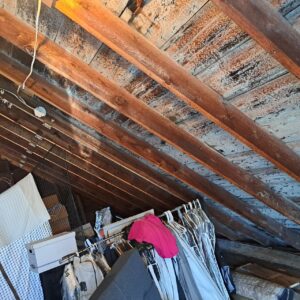Selling Your Home? Why Mold Removal Should Be on Your Pre-Listing Checklist
 Selling a home is all about making a great first impression. From staging your living room to sprucing up curb appeal, sellers invest time and money into showcasing their home’s best features. But there’s one hidden issue that can stop a sale in its tracks: mold.
Selling a home is all about making a great first impression. From staging your living room to sprucing up curb appeal, sellers invest time and money into showcasing their home’s best features. But there’s one hidden issue that can stop a sale in its tracks: mold.
Whether it’s a small patch in the basement or spores hiding in your HVAC system, mold can derail negotiations, tank your home’s value, and lead to lengthy inspection disputes. Here’s why mold remediation should be on every homeowner’s pre-listing checklist—and how taking care of it now can protect your sale later.
Why Mold Is a Deal Breaker for Buyers
Today’s buyers are more informed and more cautious. With home prices high and inspections standard, many are unwilling to compromise on hidden health hazards, and mold tops that list.
Here’s what mold signals to buyers:
- Poor home maintenance
- Potential water damage issues
- Expensive cleanup down the road
- Health risks for children or immunocompromised family members
Even minor mold issues can result in a lower offer, or worse, a complete withdrawal.
Home Inspections Will Reveal It Anyway
It’s tempting to hope that a few spots of mold will go unnoticed during showings. But any serious buyer will schedule a professional inspection before closing. And mold is one of the first things inspectors look for, especially in:
- Basements or crawlspaces
- Attics with poor ventilation
- Around windows and bathrooms
- Inside HVAC systems and ductwork
- Behind the drywall affected by leaks
Once discovered, mold often triggers requests for remediation, price reductions, or delayed closings—all of which can cost you time, stress, and money.
The Financial Impact of Ignoring Mold Before Listing
Let’s say mold is discovered after an offer is accepted. Now you’re under pressure to remediate quickly to keep the sale moving. You may end up:
- Paying rush fees for emergency remediation
- Losing negotiation leverage, leading to concessions
- Delaying your timeline for closing or moving
- Facing a deal collapse if the buyer gets cold feet
Instead of reacting after the fact, proactive mold removal protects your asking price and streamlines the entire transaction.
Mold and Disclosure Laws in Massachusetts
Massachusetts sellers are not legally required to disclose mold, but they must answer honestly if asked. And if an inspector finds visible signs of mold, buyers can question whether the seller tried to hide it. This creates distrust and could even open the door to legal issues.
Having a pre-sale mold inspection and certification of mold remediation not only makes your home more marketable, but it also shows transparency and builds buyer confidence.
Why Mold Is So Common in the Greater Boston Area
In New England’s climate, mold growth is a year-round risk. Cold winters, humid summers, and older homes with aging insulation or HVAC systems all contribute to hidden moisture problems. Common causes include:
- Leaky pipes or appliances
- Condensation in the attic or ductwork
- Poor ventilation in bathrooms or basements
- Flooded basements or sump pump failure
- Improper sealing around windows or foundations
Even if your home looks clean, mold may be lurking in walls, under flooring, or inside your air ducts.
Professional Mold Remediation: A Smart Pre-Sale Investment
Hiring a certified mold removal company—like Aspen Environmental—before listing ensures the job is done right and provides documentation buyers trust. Our process includes:
- Thorough Mold Inspection – Using infrared imaging and air quality testing to detect mold behind walls and in hidden spaces.
- Certified Mold Remediation – Removing contaminated materials safely and following strict EPA guidelines.
- Duct Cleaning & Sealing – Preventing future mold by removing spores and sealing moisture-prone ductwork.
- Post-Remediation Testing – Verifying your home is safe, clean, and ready for showings.
- Documentation for Buyers – A clean bill of health from a licensed remediation company improves buyer confidence.
Make Your Home More Attractive to Buyers
A mold-free home isn’t just safer—it’s more marketable. By addressing mold before listing, you:
- Eliminate a major buyer objection
- Prevent deal-breaking inspection issues
- Protect your home’s value
- Avoid delays or legal risk
- Present a healthier, move-in-ready property
It’s one of the most important behind-the-scenes upgrades you can make, especially in a competitive market like Boston.

